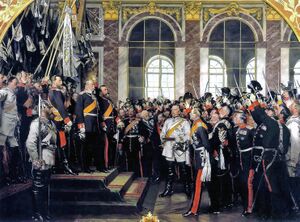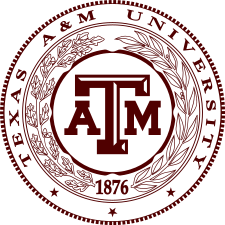Difference between revisions of "1871"
Jump to navigation
Jump to search
1861 < 1862 < 1863 < 1864 < 1865 < 1866 < 1867 <1868 < 1869 < 1870 < 1871 > 1872 > 1873 > 1874 > 1875 > 1876 > 1877 > 1878 > 1879 > 1880 > 1881
m (add image) |
(unstub) |
||
| Line 4: | Line 4: | ||
|image_caption=The German Empire was founded in January 1871, after the joint victory of the German states in the Franco-Prussian War | |image_caption=The German Empire was founded in January 1871, after the joint victory of the German states in the Franco-Prussian War | ||
}} | }} | ||
| + | == Events == | ||
| + | * [[January 18]] – [[Proclamation of the German Empire]]: The member states of the [[North German Confederation]] and the south German states, aside from Austria, unite into a single [[nation state]], known as the [[German Empire]]. The [[King of Prussia]] is declared the first [[German Emperor]] as [[Wilhelm I of Germany]], in the [[Hall of Mirrors]] at the [[Palace of Versailles]]. [[Constitution of the German Confederation (1871)|Constitution of the German Confederation]] comes into effect. | ||
| + | * [[March 21]] – [[Otto von Bismarck]] becomes the first [[Chancellor of the German Empire]]. | ||
| + | * [[March 26]] – The [[Paris Commune]] is formally established in France. | ||
| + | * [[April 20]] – U.S. President [[Ulysses S. Grant]] signs the [[Civil Rights Act of 1871]]. | ||
| + | * [[May 10]] – The [[Treaty of Frankfurt (1871)|Treaty of Frankfurt]] is signed, confirming the frontiers between Germany and France. The provinces of [[Alsace]] and [[Lorraine (province)|Lorraine]] are transferred from France to Germany. | ||
| + | * [[May 21]]– French government troops enter Paris to overthrow the Commune, beginning "Bloody Week" (''[[Semaine sanglante]]''). | ||
| + | * [[May 27]] – French government troops massacre [[Communards]] from Belleville, at [[Père-Lachaise Cemetery]] in Paris. | ||
| + | * [[May 28]] – [[Paris Commune]] falls to French government forces. | ||
| + | * [[June 1]] – [[Bombardment of the Selee River Forts]]: Koreans attack two United States Navy warships. | ||
| + | * [[June 10]] – [[United States expedition to Korea]]: Captain McLane Tilton leads 109 members of the [[United States Marine Corps]] in a punitive naval attack on the [[Han River (Korea)|Han River]] forts on [[Ganghwa Island]] in Korea, resulting in 250 Koreans dying and diplomatic failure to "open up" Korea. | ||
| + | * [[June 29]] – [[Trade union]]s are legalized in the United Kingdom by the [[Trade Union Act 1871]]. | ||
| + | * [[August 31]] – [[Adolphe Thiers]] becomes President of the French Republic. | ||
| + | * [[September 3]] – New York City residents, tired of the corruption of the "[[Tammany Hall]]" political machine and "Boss" [[William M. Tweed]], its "Grand Sachem", meet to form the '[[Committee of Seventy (New York City)|Committee of Seventy]]' to reform local politics. | ||
| + | * [[October 12]] – The [[Criminal Tribes Act]] is enacted by the [[British Raj]] in India, naming over 160 communities as "[[Denotified Tribes]]", allegedly habitually criminal (it will be repealed in [[1949]], after Indian independence). | ||
| + | ** [[Boss Tweed]] of [[Tammany Hall]] is arrested for bribery, ending his grip on New York City. | ||
| + | * c. November – The [[South Improvement Company]] is formed in Pennsylvania by [[John D. Rockefeller]] and a group of major United States railroad interests, in an early effort to organize and control the American petroleum industry. | ||
| + | * [[November 7]] – The London–Australia [[telegraph]] cable is brought ashore at [[Darwin, Northern Territory|Darwin]].<ref>https://web.archive.org/web/20150105222157/http://atlantic-cable.com/Cables/1871Java-PortDarwin/ </ref> | ||
| + | * [[November 10]] – [[Henry Morton Stanley]], Welsh-born correspondent for the ''[[New York Herald]]'', locates missing Scottish explorer and missionary Dr. [[David Livingstone]] in [[Ujiji]], near [[Lake Tanganyika]], and greets him by saying, "Dr. Livingstone, I presume?" | ||
| + | * [[December 10]] – German chancellor [[Otto von Bismarck]] tries to ban [[Catholic Church|Catholics]] from the political stage, by introducing harsh laws concerning the [[separation of church and state]]. | ||
| + | === Date unknown === | ||
| + | * In South Africa | ||
| + | ** [[Gold]] is discovered at Pilgrim's Creek in the [[Pilgrim's Rest, Mpumalanga|Pilgrim's Rest]] area. | ||
| + | ** A {{Convert|83.50|carat|g}} diamond is discovered, resulting in a [[diamond rush]], and the town of [[Kimberley, Northern Cape|New Rush]] springs up; Colonial Commissioners arrive there on November 17. | ||
| + | |||
{{SMWDocs}} | {{SMWDocs}} | ||
==References== | ==References== | ||
<references/> | <references/> | ||
Latest revision as of 12:09, 14 March 2021
 The German Empire was founded in January 1871, after the joint victory of the German states in the Franco-Prussian War |
Events
- January 18 – Proclamation of the German Empire: The member states of the North German Confederation and the south German states, aside from Austria, unite into a single nation state, known as the German Empire. The King of Prussia is declared the first German Emperor as Wilhelm I of Germany, in the Hall of Mirrors at the Palace of Versailles. Constitution of the German Confederation comes into effect.
- March 21 – Otto von Bismarck becomes the first Chancellor of the German Empire.
- March 26 – The Paris Commune is formally established in France.
- April 20 – U.S. President Ulysses S. Grant signs the Civil Rights Act of 1871.
- May 10 – The Treaty of Frankfurt is signed, confirming the frontiers between Germany and France. The provinces of Alsace and Lorraine are transferred from France to Germany.
- May 21– French government troops enter Paris to overthrow the Commune, beginning "Bloody Week" (Semaine sanglante).
- May 27 – French government troops massacre Communards from Belleville, at Père-Lachaise Cemetery in Paris.
- May 28 – Paris Commune falls to French government forces.
- June 1 – Bombardment of the Selee River Forts: Koreans attack two United States Navy warships.
- June 10 – United States expedition to Korea: Captain McLane Tilton leads 109 members of the United States Marine Corps in a punitive naval attack on the Han River forts on Ganghwa Island in Korea, resulting in 250 Koreans dying and diplomatic failure to "open up" Korea.
- June 29 – Trade unions are legalized in the United Kingdom by the Trade Union Act 1871.
- August 31 – Adolphe Thiers becomes President of the French Republic.
- September 3 – New York City residents, tired of the corruption of the "Tammany Hall" political machine and "Boss" William M. Tweed, its "Grand Sachem", meet to form the 'Committee of Seventy' to reform local politics.
- October 12 – The Criminal Tribes Act is enacted by the British Raj in India, naming over 160 communities as "Denotified Tribes", allegedly habitually criminal (it will be repealed in 1949, after Indian independence).
- Boss Tweed of Tammany Hall is arrested for bribery, ending his grip on New York City.
- c. November – The South Improvement Company is formed in Pennsylvania by John D. Rockefeller and a group of major United States railroad interests, in an early effort to organize and control the American petroleum industry.
- November 7 – The London–Australia telegraph cable is brought ashore at Darwin.[1]
- November 10 – Henry Morton Stanley, Welsh-born correspondent for the New York Herald, locates missing Scottish explorer and missionary Dr. David Livingstone in Ujiji, near Lake Tanganyika, and greets him by saying, "Dr. Livingstone, I presume?"
- December 10 – German chancellor Otto von Bismarck tries to ban Catholics from the political stage, by introducing harsh laws concerning the separation of church and state.
Date unknown
- In South Africa
- Gold is discovered at Pilgrim's Creek in the Pilgrim's Rest area.
- A 83.50 carats (16.700 g) diamond is discovered, resulting in a diamond rush, and the town of New Rush springs up; Colonial Commissioners arrive there on November 17.
Events
| Event | Start | End |
|---|---|---|
| Pax Brittanica | 1815 | 1915 |
| Victorian era | 1840 | 1901 |
New Groups
| Group | Image | Type | Description |
|---|---|---|---|
| Cambridge University/Newnham College |  | A women only college at Cambridge | |
| Social Democrats (Denmark) |  | Ruling party in Denmark | |
| University of Arkansas |  | Public Flagship Land-grant | The largest university in Arkansas |
| Ohio Northern University |  | Small Midwestern private university | |
| Smith College |  | College | A private liberal arts women's college in Northampton, Massachusetts. |
| Texas A&M University |  | Research Public Land-grant Sea grant Space grant Senior military college | Texas university close to Big Pharma and other corporations |
| University of Otago |  | Public | University in New Zealand |
Births
| Title | Born | Place of birth | Died | Summary | Description |
|---|---|---|---|---|---|
| Charles Norton | 1871 | 1923 | Banker Deep state operative | USDSO | |
| Felix Warburg | 14 January 1871 | Germany Hamburg | 20 September 1937 | Financier Deep politician | Super wealthy financier and deep politician. |
| Arthur Ponsonsby | 16 February 1871 | 23 March 1946 | Politician Pacifist | British politician, writer, and social activist. His 1928 book Falsehood in War-time, Containing an Assortment of Lies Circulated Throughout the Nations During the Great War, listed and refuted pieces of propaganda used by the Allied Forces during World War 1. | |
| Thomas Cochran | 20 March 1871 | Minnesota Saint Paul | 29 October 1936 | Banker | American bonesman banker closely associated with the leading J.P. Morgan & Co bankers such as Dwight P. Morrow and Henry P. Davidson in the firms big financial operations during and after World War 1. |
| Henry Strakosch | 9 May 1871 | 30 October 1943 | Banker Businessperson | Banker who paid Winston Churchill's large debts "without asking anything in return". Chair of The Economist 1929-1943 | |
| Frank Polk | 13 September 1871 | New York United States | 7 February 1943 | Lawyer | |
| Cordell Hull | 2 October 1871 | United States Tennessee Olympus Pickett County | 23 July 1955 | Politician Lawyer | The longest serving US Secretary of State, granted the Nobel Peace Prize in 1945 for his role in establishing the United Nations, and was referred to by President Roosevelt as the "Father of the United Nations". |
| Meyer London | 29 December 1871 | Congress Poland Russia/Tsarist Russia Kalvarija | 6 June 1926 | Politician | Socialist Congressman who voted against entry into World War I. Died prematurely in 1926, when struck by an automobile. |
Many thanks to our Patrons who cover ~2/3 of our hosting bill. Please join them if you can.